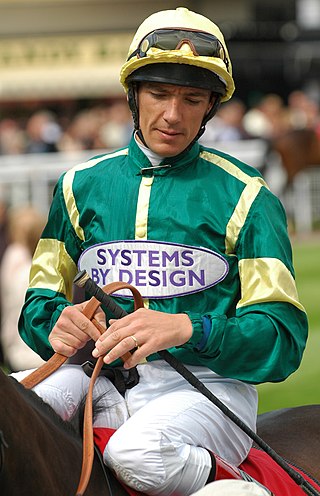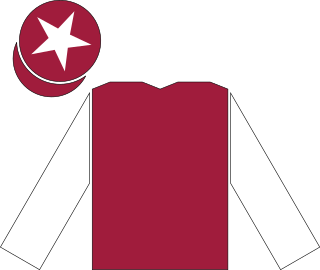Description
Weight for age means that a horse will carry a set weight in accordance with the Weight for Age Scale. This weight varies depending on the horse's age, its sex, the race distance and the month of the year. Weight for age races are usually Group 1 races, races of the highest quality. It is a form of handicapping for horse racing, but within the horse racing industry is not referred to as handicap, which is reserved for more general handicapping.
WFA is a method of trying to equal out the physical progress which the average thoroughbred racehorse makes as it matures. The thoroughbred matures extremely quickly compared to the human being. By the age of two the horse has achieved 95% of its mature height and weight, and by the end of its third year it will be fully mature. To allow for this variation in maturity in the context of racing, it is necessary to express it as a function of the weight a horse will carry in a race. It is also necessary to take into account the race distance because stamina comes with maturity, and younger horses are at a greater disadvantage the farther they have to run. If no allowance was made, a mature older horse would always beat a younger one.

Thoroughbred racing is a sport and industry involving the racing of Thoroughbred horses. It is governed by different national bodies. There are two forms of the sport – flat racing and jump racing, the latter known as National Hunt racing in the UK and steeplechasing in the US. Jump racing can be further divided into hurdling and steeplechasing.

Thoroughbred horse racing is a spectator sport in Australia, and gambling on horse races is a very popular pastime with A$14.3 billion wagered in 2009/10 with bookmakers and the Totalisator Agency Board (TAB). The two forms of Thoroughbred horseracing in Australia are flat racing, and races over fences or hurdles in Victoria and South Australia. Thoroughbred racing is the third most attended spectator sport in Australia, behind Australian rules football and rugby league, with almost two million admissions to 360 registered racecourses throughout Australia in 2009/10. Horseracing commenced soon after European settlement, and is now well-appointed with automatic totalizators, starting gates and photo finish cameras on nearly all Australian racecourses.
The Breeders' Cup Mile is a 1-mile (1.6 km) Grade 1 Weight for Age stakes race for thoroughbred racehorses three years old and up, run on a grass course. It has been conducted annually as part of the Breeders' Cup World Championships since the event's inception in 1984. All Breeders' Cups to date have been held in the United States except for the 1996 event in Canada.
The Breeders' Cup Turf is a Weight for Age Thoroughbred horse race on turf for three-year-olds and up. It is held annually at a different racetrack in the United States or Canada as part of the Breeders' Cup World Championships. The race's current title sponsor is Longines.

Lanfranco "Frankie" Dettori, is an Italian jockey who was based in England for a career spanning over 35 years. He was British flat racing Champion Jockey three times and rode the winners of 287 Group 1 races including 23 winners of the British Classic Races. His most celebrated achievement was riding all seven winners on British Festival of Racing Day at Ascot Racecourse on 28 September 1996.

Distorted Humor is an American Thoroughbred racehorse and a successful sire.

John Harry Martin Gosden is a British racehorse trainer. He has trained over 3,000 winners worldwide, including winners of the Breeders' Cup Classic, the Derby, the Arc, the King George, the Eclipse. He has over 600 winners in the United States.
Juddmonte Farms is a horse breeding farm, owned until his death on 12 January 2021 by Prince Khalid bin Abdullah of Saudi Arabia.
The Breeders' Cup Challenge is a series of Thoroughbred horse races in which the winner earns an automatic spot in a specified Breeders' Cup race. The challenge races change somewhat each year. The Challenge series began in 2007 with 24 "Win and You're In" races from 2 countries. By 2014, the series had grown to 71 races across 13 countries. During that period, 24 winners of Breeders' Cup races had qualified via the challenge series.
The Breeders' Cup Turf Sprint is a Weight for Age stakes race for thoroughbred racehorses three years old and up. As its name implies, it is a part of the Breeders' Cup World Championships, the de facto year-end championship for North American thoroughbred racing. The distance of the race will vary depending on the host track's turf course requirements.
Candy Ride is a retired Thoroughbred racehorse who went undefeated in six starts on both turf and dirt racing surfaces in Argentina and the United States. In Argentina, he won the Gran Premio San Isidro and the Joaquin S. de Anchorena, setting a world record of 1:31.01 for 1,600 meters on the turf in the latter. He was named Argentina's Champion Miler of 2002. Relocated to the United States in 2003, he won the American Handicap and set a track record in the Pacific Classic Stakes. Retired to stud in Kentucky, he developed into a top 10 sire whose notable offspring include American Horse of the Year Gun Runner.
The 2009 Breeders' Cup World Championships were the 26th edition of thoroughbred racing's season ending premier event, and took place on November 6 and 7 during the Oak Tree meeting at Santa Anita Park in Arcadia, California. The event was telecast by ESPN. The Breeders' Cup is generally regarded as the end of the North America racing season, although a few Grade I events take place in later November and December.

William Buick is a Norwegian-British flat jockey. He shared the champion apprentice jockey title in 2008 with David Probert and won the Lester Award for Apprentice Jockey of the Year in 2007 and 2008. From 2010 to 2014 he was stable jockey to John Gosden. In 2015 he signed with Godolphin. Buick won his first Group1 race in Canada in 2010 and since then has won Group 1 races in England, France, Germany, Hong Kong, Ireland, Italy, Japan, the United Arab Emirates and the United States. He has won four British Classic Races: the St Leger in 2010, 2011 and 2021 and the Derby in 2018.

Shantou was a classic-winning Thoroughbred racehorse and sire. As a three-year-old in 1996 he won the St. Leger and the Gran Premio del Jockey Club as well as finishing third in the Epsom Derby and fourth in the Breeders' Cup Turf. In the following year he won the Gran Premio di Milano and the Princess of Wales's Stakes. After his retirement from racing he had success as a sire of National Hunt horses.
Miswaki was an American-bred Thoroughbred racehorse that was a Group One winner in France and a stakes race winner in the United States. He was an important sire of 97 stakes race winners and was the Leading broodmare sire in Great Britain and Ireland in 1999 and 2001.
The 2014 Breeders' Cup Challenge series provided winners of the designated races an automatic "Win and You're In" Berth in the 2014 Breeders' Cup. Races were chosen by the Breeders' Cup organization and included key prep races in the various Breeders' Cup divisions from around the world.
The 2012 Breeders' Cup Challenge series provided winners of the designated races with an automatic "Win and You're In" Berth in the 2012 Breeders' Cup. Races were chosen by the Breeders' Cup organization and included key prep races in the various Breeders' Cup divisions from around the world.
The 2019 Breeders' Cup Challenge series consisted of 86 horse races that provided the respective winners with an automatic "Win and You're In" Berth in the 2019 Breeders' Cup, held on November 1 and 2. Races were chosen by the Breeders' Cup organization and included key races in the various Breeders' Cup divisions from around the world. The Breeders' Cup organization paid the Breeders' Cup entry fee for the challenge race winners, provided they had been nominated as foals.
The 2020 Breeders' Cup Challenge series consists of horse races from around the world that provide the respective winners with an automatic "Win and You're In" Berth in the 2020 Breeders' Cup, to be held on November 6 and 7. Races are chosen by the Breeders' Cup organization and include key races in the various Breeders' Cup divisions. The Breeders' Cup organization pays the Breeders' Cup entry fee for the challenge race winners, provided they had been nominated as foals.






